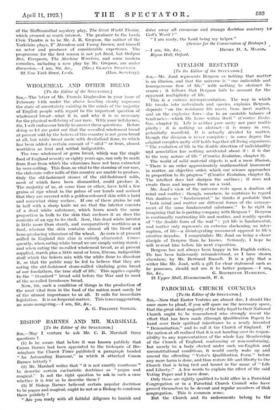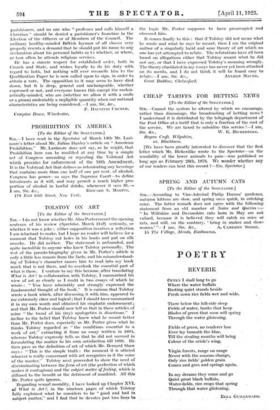PAROCHIAL CHURCH COUNCILS
[To the Editor of the SPECTATOR.] SIR,—Now that Easter Vestries are almost due, I should like once more to plead, if you will spare me the necessary space, that the great silent majority of the laity loyal to their National Church ought to be remembered who strongly resent the effort that has been made (through Qualification Paper) to hand over their spiritual inheritance to a newly invented " Denomination," and to call it the Church of England. If the nation at all realized that it is not handing over its respon- sibility to any representatives of the whole Lay Membership of the Church of England, conforming or non-conforming, but merely to a body elected under such un-English and unconstitutional conditions, it would surely wake up and amend the offending " Voter's Qualification Form " before any more harm is done, and thus restore life and liberty to the Church that is being tied and bound in the name of " Life and Liberty." A few words to explain the effect of the said Voting Paper and I have done.
Only those are rightly qualified to hold office in a Parochial Congregation or in a Parochial Church Council who have proved themselves to be devout and regular members of that congregation. This is common sense.
But the Church and its endowments belong to the
parishioners, and no one who " professes and calls himself a Christian " should be denied a parishioner's franchise in the Election of the Officers or of Members of the Council. The ordinary healthy-minded British layman of all classes very properly resents a demand that he should put his name to any declaration about his personal habits as to whether, or where, or how often he attends religious services.
lie has a sincere respect- for established order, both in Church and State, and wishes loyally to do his duty with regard to both, but nothing will ever reconcile him to the Qualification Paper he is now called upon to sign, in order to obtain a vote. The opposition to it may seem to have died down, but it is deep, general and unchangeable, whether expressed or not, and everyone knows this except the ecclesi- astically-minded, who are (whether we allow it with a smile or a groan) undeniably a negligible quantity when our national characteristics are being considered.—I am, Sir, &c.,











































 Previous page
Previous page